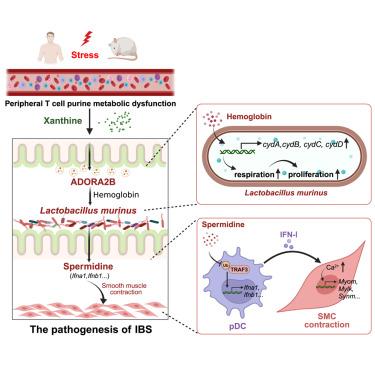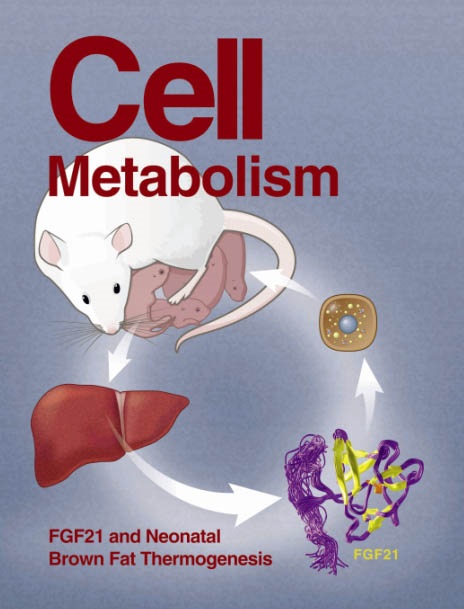压力通过精胺介导的 I 型干扰素下降引发肠易激综合征伴腹泻
IF 30.9
1区 生物学
Q1 CELL BIOLOGY
引用次数: 0
摘要
肠易激综合征伴腹泻(IBS-D)是一种常见的慢性胃肠道疾病,以腹部不适和偶尔腹泻为特征。肠易激综合征的发病机制被认为与多种因素有关,包括心理压力、肌肉异常收缩、肠道微生物组的炎症和紊乱。然而,目前仍缺乏对这些因素之间逻辑调控相关性的全面分析。在这项研究中,我们发现压力会诱导黄嘌呤的过度分泌,并改变肠道中鼠乳杆菌的丰度和代谢特征。鼠乳杆菌衍生的亚精胺通过抑制 TRAF3 的 K63 链接多泛素化,抑制了浆细胞树突状细胞中 I 型干扰素(IFN)-α 的基础表达。IFN-α的减少解除了结肠平滑肌细胞的收缩功能,从而增加了肠蠕动。我们的研究结果为压力暴露型 IBS-D 的病理机制和新的药物靶点提供了理论依据。本文章由计算机程序翻译,如有差异,请以英文原文为准。

Stress triggers irritable bowel syndrome with diarrhea through a spermidine-mediated decline in type I interferon
Irritable bowel syndrome with diarrhea (IBS-D) is a common and chronic gastrointestinal disorder that is characterized by abdominal discomfort and occasional diarrhea. The pathogenesis of IBS-D is thought to be related to a combination of factors, including psychological stress, abnormal muscle contractions, and inflammation and disorder of the gut microbiome. However, there is still a lack of comprehensive analysis of the logical regulatory correlation among these factors. In this study, we found that stress induced hyperproduction of xanthine and altered the abundance and metabolic characteristics of Lactobacillus murinus in the gut. Lactobacillus murinus-derived spermidine suppressed the basal expression of type I interferon (IFN)-α in plasmacytoid dendritic cells by inhibiting the K63-linked polyubiquitination of TRAF3. The reduction in IFN-α unrestricted the contractile function of colonic smooth muscle cells, resulting in an increase in bowel movement. Our findings provided a theoretical basis for the pathological mechanism of, and new drug targets for, stress-exposed IBS-D.
求助全文
通过发布文献求助,成功后即可免费获取论文全文。
去求助
来源期刊

Cell metabolism
生物-内分泌学与代谢
CiteScore
48.60
自引率
1.40%
发文量
173
审稿时长
2.5 months
期刊介绍:
Cell Metabolism is a top research journal established in 2005 that focuses on publishing original and impactful papers in the field of metabolic research.It covers a wide range of topics including diabetes, obesity, cardiovascular biology, aging and stress responses, circadian biology, and many others.
Cell Metabolism aims to contribute to the advancement of metabolic research by providing a platform for the publication and dissemination of high-quality research and thought-provoking articles.
 求助内容:
求助内容: 应助结果提醒方式:
应助结果提醒方式:


